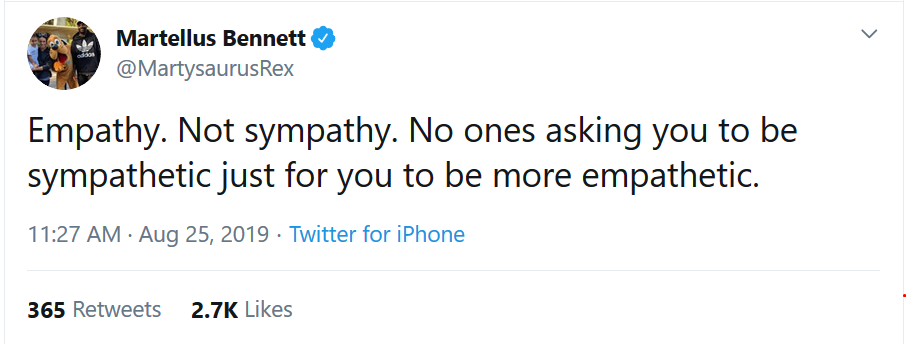Empathy not Sympathy
It seems like the biggest story of the week in the world of sports was the retirement of Indianapolis Colts Quarterback Andrew Luck. He cited years or injury, rehabilitation, and pain as his reason for retiring and the reaction was both horrifying and affirming. For some, their hot-take reactions were really only about what his loss would mean for his team. But others defended Luck’s motives and his right to make his decision. One voice caught my ear, in particular, Martellus Bennett—a retired NFL player and children’s author.
Reacting to Luck’s critics, he said simply, “Empathy. Not sympathy. No one’s asking you to be sympathetic, just for you to be more empathetic.” He was talking about Andrew Luck, but I think that Tweet captures the spirit of this moment in our nation’s history better than just about anything I’ve read or heard.
The distinction between the two terms is both subtle and profound. Sympathy is a feeling of sorrow for someone else’s misfortune. Empathy is sharing in that misfortune. Bennett was challenging everyone being critical of Luck’s decision to share in Luck’s own emotional pain over the decision. Sympathy is about my reaction to someone else’s pain. Empathy is about that person’s pain. Sympathy is about self; empathy is about other. I learned long ago that I when I put myself in someone else’s shoes—even for just a moment—I see the world from a different perspective.
Students will be coming back to Salve Regina University, where I work, this weekend. We often talk about the world needing a new style of leadership: one grounded in empathy and a willingness of leaders to walk with others through the challenges of life.
For me, this is powerful stuff. It’s the difference between seeing migrants as pawns to terrorize in order to deter others from coming and human beings seeking a better life. It’s the difference between offering “thoughts and prayers” to the victims of gun violence and actually doing something about it. It’s the difference between watching waters rise and fires burn and finally doing something about climate change. It’s the difference between complaining about the cost of healthcare and making sure that every American actually has healthcare. It’s the difference between fretting overstandardized test scores and addressing the hunger, poverty, and violence that keep kids from learning in too many communities across America. It’s the difference between mourning the loss of life to opioid addiction and giving people the help they need to get their lives back.
There’s an old story about a man, let’s call him “Joe,” who fell in a ditch. As others passed by, Joe would call up and ask for help. One person walked by and seeing Joe in the ditch promised to call for help. A priest walked by and said he’d say a prayer. Then a friend walked by, and hearing Joe’s cries from the ditch, jumped into it with him. Astonished, Joe looked at his friend and said, “What are you doing? You should have gotten a rope or a ladder!” The friend grasped Joe by the arm, looked him in the eye, and said, “Nah, I’ve been down here before and I know the way out.”
Leadership today has to be like Joe’s friend. It has to be empathetic. We have to jump in that ditch with our friend, so that together, we find the way out.

